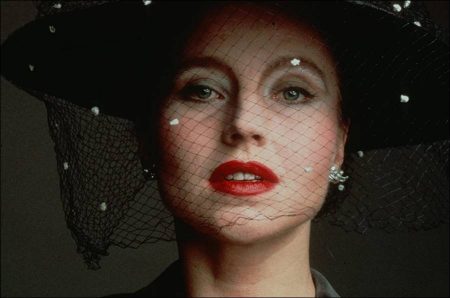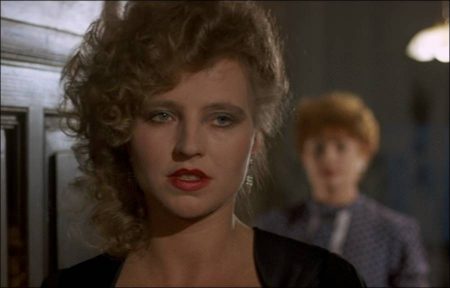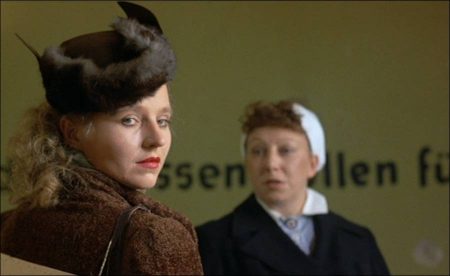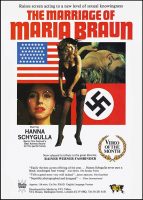Taglines: The Marriage Of Maria Braun… the marriage lasted no longer than half a day and a full night.
The Marriage of Maria Braun movie storyline. Immediately following Maria and Hermann Braun’s wedding during WWII, Hermann, a soldier in the German army, returns to active duty to fight on the Russian front. Hermann goes MIA, he or his body not yet having been found by the end of the war. The situation of post-war Germany and Hermann’s missing status makes life difficult for poor Maria, who also supports her long widowed mother with who she lives. Maria uses her cunning and her beauty and feminine wiles to survive.
In using all of the above in dealing with men, Maria will do much to get what she wants, including having sex for financial gain and to satisfy her sexual needs, but she is up front that she will never marry any of those men, many who would want to marry her, in her love and memory for Hermann. Maria’s situation and the primary reason for wanting/needing money changes over time, but her ability to manipulate especially men for her own gain does not change. However, one of those men may know more about Maria’s life than she would imagine, which may affect she reaching her end goal.
The Marriage of Maria Braun (German: Die Ehe der Maria Braun) is a 1978 West German film directed by Rainer Werner Fassbinder. The film stars Hanna Schygulla as Maria, whose marriage to the soldier Hermann remains unfulfilled due to World War II and his post-war imprisonment. Maria adapts to the realities of post-war Germany and becomes the wealthy mistress of an industrialist, all the while staying true to her love for Hermann. The film was one of the more successful works of Fassbinder and shaped the image of the New German Cinema in foreign countries. The film is the first installment of Fassbinder’s BRD Trilogy, followed by Lola and Veronika Voss.
About the Story
The film starts in Germany in 1943. During an Allied bombing raid Maria marries the soldier Hermann Braun. After “half a day and a whole night” together, Hermann returns to the Eastern front the following day. Following the end of the war, Maria is informed that Hermann has been killed. Maria starts work as a hostess in a bar frequented by American soldiers. She has a relationship with African-American soldier Bill, who supports her and gives her nylon stockings and cigarettes. She becomes pregnant by Bill.
However, Hermann was not killed, and returns home to discover Maria and Bill undressing each other. A fight between Hermann and Bill ensues. When Hermann seems in danger, Maria unintentionally kills Bill, striking his head with a full bottle. Maria is tried by a military tribunal and expresses her love for both Bill and Hermann; Hermann is so struck with Maria’s devotion that he takes the blame for the killing and is imprisoned.

Maria (apparently) aborts her pregnancy and asks her doctor to promise to maintain the grave. On the train home, Maria catches the eye of a wealthy industrialist, Karl Oswald. Oswald, an older man, offers her a position as his assistant, and shortly thereafter Maria becomes his mistress to “maintain the upper hand”. Maria visits Hermann again and tells him about the development, promising that their life will start as soon as he is released. Maria becomes wealthy and buys a house.
Oswald visits Hermann and offers to make him and Maria heirs to his wealth if Hermann deserts Maria after his release. Neither man tells Maria of their agreement. On release, Hermann emigrates to Canada and sends Maria a red rose each month to remind her he still loves her.
The Marriage of Maria Braun (1979)
Directed by: Rainer Werner Fassbinder
Starring: Hanna Schygulla, Klaus Löwitsch, Ivan Desny, Gisela Uhlen, Ivan Desny, Elisabeth Trissenaar, Gottfried John, Hark Bohm, George Eagles, Claus Holm, Sonja Neudorfer, Isolde Barth
Screenplay by: Peter Märthesheimer, Pea Fröhlich, Rainer Werner Fassbinder
Production Design by: Norbert Scherer
Cinematography by: Michael Ballhaus
Film Editing by: Rainer Werner Fassbinder, Juliane Lorenz
Costume Design by: Barbara Baum
Set Decoration by: Arno Mathes, Hans-Peter Sandmeier, Andreas Willim
Music by: Peer Raben
MPAA Rating: None.
Distributed by: United Artists (West Germany), New Yorker Films (United States)
Release Date: March 23, 1979 (West Germany)
Views: 244


